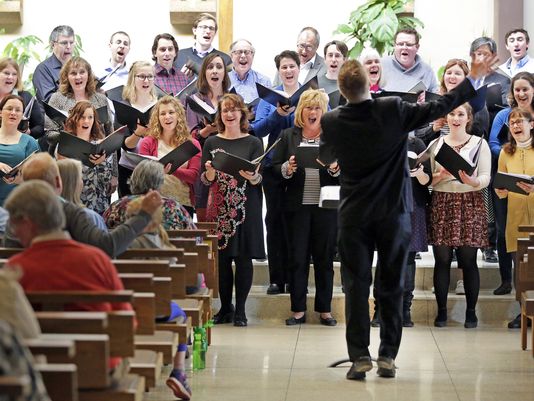Group Singing Creates Joy!
Posted in Dementia Research | Tagged in group singing, susan mcfadden, dementia, alzheimer's, dementia fox valley

A recent study published in one of the top gerontology journals confirms what many people in the Fox Valley have already learned: group singing has many benefits for people with dementia and their care partners. Researchers in England interviewed seventeen couples who participated in a variety of types of singing groups. Everyone agreed that the group singing experiences were joyful and accessible.
Before describing how they conducted the research and analyzed the results, the researchers began bystating, “The majority of recommended interventions for people with dementia are pharmacological” (p. 469).In England and Scotland, however, another approach has emerged alongside the pharmacological: it is called“social prescribing” (https://www.kingsfund.org.uk/topics/primary-and-community-care/social-prescribing). This innovative approach to making life better for people living with dementia has already been embraced by theFox Valley Memory Project (FVMP). The FVMP has developed “prescription pads” as an easy way to tellpeople about the many programs and services of the FVMP. With one simple tear off sheet, a health care provider can let patients know that they live in a community that offers joyful and accessible experiences for people with memory loss and other dementia symptoms. Talk to Lynn Ann Clausing Rusch ([email protected]) about getting prescription pads to give to your doctors, dentists, nurses, and other medical professionals.
The research on group singing identified many benefits for people with dementia and care partners. Oneperson said, “It makes one feel more cheerful and happy; yes it gets one out of oneself” (p 473). A significantreward came from the feeling of belonging to a social group and forming relationships with others. Care partners also felt released from caring responsibilities during the group singing programs. For example, onecare partner said, “It was something we could do together, where I wasn’t responsible.”
The researchers stated that one of the most important factors making the group singing joyful and accessible was the leadership of an effective group facilitator. Here is another way people living with dementia in our community are blessed. The professionalism, compassion, and exuberance of Frank Rippl, director of theFVMP’s “On a Positive Note” chorus, and of Christy Feuerstahler, leader of the Lyrics & Laughter programoffered by Valley VNA Services verify the findings in this research.
Another point emphasized by the people who participated in this research was how the group singing experiences helped them overcome inhibitions about not being able to sing well; some of these beliefs wereformed in childhood when people told them they could not “carry a tune.” They also talked about how whenthey were singing, the “differences between the people with dementia, facilitators, and caregivers became less important” (p. 476). The researchers concluded that “this blurring of role identity” (p. 477) served not onlythe participants in the group singing, but also the wider community by showing how people living with dementia (both those diagnosed and their care partners) can bring joy to others.
In addition to the formal group singing experiences offered in the Fox Valley, many of the FVMP’s memory cafés feature sing-alongs. Memory café participants confirm what hundreds of researchers have been learning: making music together is good for the body, the mind, and the spirit.
Susan McFadden
Unadkat, S., Camic, P. M., & Vella-Burrows, T. (2017). Understanding the experience of group singing for couples where one partner has a diagnosis of dementia. The Gerontologist, 57, 469-478.
Leave a Reply